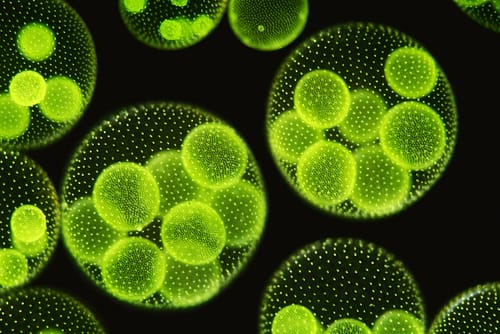Autotrophic micro-algae are an interesting alternative to fish oil as a source for long chain omega-3 fatty acids (EPA and DHA). The advantages of such ‘autotrophic omega-3 producing micro-algae’ as compared to fish oil, are:
- EPA and DHA are present in the form of polar lipids, which gives a possible advantage to oxidative stability and bio-availability
- There is a substantial concentration of carotenoids present, which have different health effects on the human body (anti-oxidant activity and specific health benefits for specific carotenoids)
- The carotenoids protect the oil from oxidation, which is a very important advantage in view of the oxidative instability of the poly-unsaturated long-chain omega-3 fatty acids
- The presence of a quantity of phytosterols
These benefits were recorded by the research group Food & Lipids (KULeuven Kulak) within the framework of the Flanders’ Food Project OMEGA OIL and the doctoral thesis of Eline Ryckebosch.
In terms of composition and properties, there are also additional important advantages concerning sustainability when using micro-algae oil instead of fish oil. Over-fishing is avoided and algae can be cultured under controlled conditions on all kinds of soil. Also, contamination by heavy metals or persistent organic compounds is not a problem.
The downstream processing of long-chain omega-3 oils from autotrophic microalgae will be elaborated in the OMEGA-extract project. In order to evaluate the feasibility of the process on an industrial scale, both technologically and economically, the goal of the project is to produce oil at the 10-50 liter scale. To achieve this objective, the different steps in the downstream processing will be carried out both on a laboratory scale and pilot scale. Different techniques will be assessed. The challenge will be to extract the polar lipids, so a regular hexane extraction cannot be used, while keeping the amount of carotenoids and the oxidative stability as high as possible.
In addition to the downstream processing, the OMEGA-project will include the culture of the right type of algae in the best growth conditions so that they can be supplied in sufficient quantities. Eventually, an economic and sustainability analysis will be carried out based on the mass and energy balance to get a full image of the feasibility of the project.
The OMEGA-extract project is supported by FISCH. FISCH identifies, stimulates and catalyzes innovations for sustainable chemistry in Flanders by supporting companies with the initiation and setup of innovative projects.
References
http://www.innovatienetwerk.be/projects/1948
http://www.fi-sch.be/nl/


